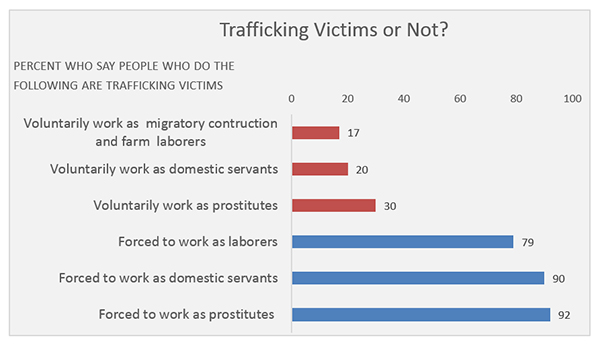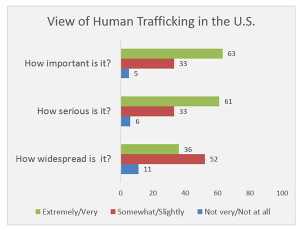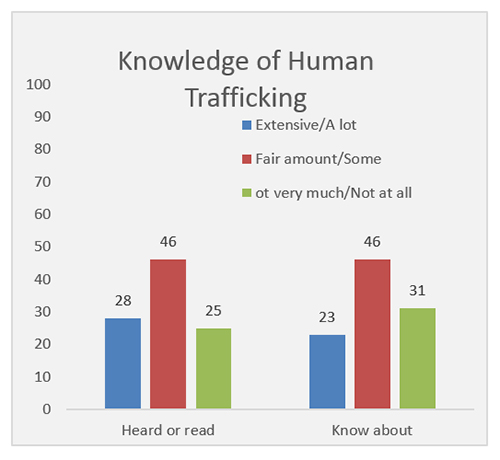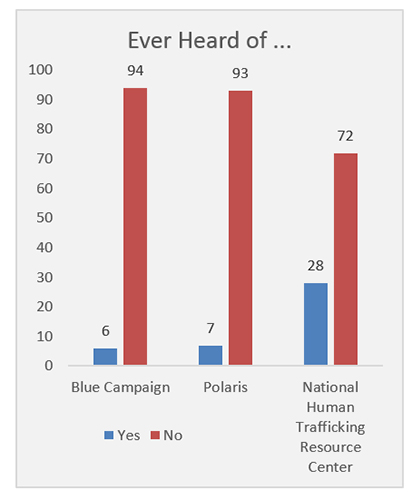Human Trafficking: Involuntary Servitude
10/26/2015
Riverdale, N.Y. – The new Fishlinger Center for Public Policy Research at the University of Mount Saint Vincent seeks to foster meaningful dialog on key public policy issues through independent, objective public opinion research. This initial survey focuses on social issues in the United States and the first report concentrates on human trafficking. Reports on other social problems covered in the survey will be released in the coming months.
The crime of human trafficking, is a pervasive problem, affecting more than 20 million people worldwide according to a 2014 U.S. State Department report.
While most Americans say human trafficking is a serious problem that is not being addressed very well in this country, it is also largely thought to have limited impact in the United States. Few people are aware of organizations within the United States that work to combat human trafficking or are willing to get involved in working toward a solution, according to the nationwide Fishlinger Center poll.
The poll was conducted online May 14 to 26 with 1,253 adults. Field work was conducted by IPSOS Public Affairs. Blacks, Hispanics and Asians were sampled at a higher rate than their proportion of the population for reasons of analysis.
What is Human Trafficking?
 Human trafficking lacks a clear definition. While being forced into prostitution, domestic service or migration work is considered human trafficking by a large majority of the public, fewer consider people working voluntarily in these positions as human trafficking.
Human trafficking lacks a clear definition. While being forced into prostitution, domestic service or migration work is considered human trafficking by a large majority of the public, fewer consider people working voluntarily in these positions as human trafficking.
The poll found large majorities think any type of involuntary activities to constitute human trafficking. About 9 in 10 say people who are forced to work as domestic servants or those working in prostitution against their will are victims of human trafficking. Nearly as many, 79 percent, consider the coercion of farm laborers and migratory construction workers to be human trafficking.
When asked about people in these positions voluntarily, most Americans have the opposite view. However, a significant minority agrees that they are at least in part victims of human trafficking. Thirty percent say willing prostitutes can be victims of trafficking, and 20 percent say the same about voluntary domestic servants. Nearly as many, 17 percent, say people working in construction or on farms may be victims of trafficking.
These results illustrate some of the problems with the definition of human trafficking. Of those who said voluntary prostitution was not trafficking, nearly two-thirds mentioned the lack of force as the determining factor.
Obviously, holding people held against their will and physically forcing them into commercial sex or unpaid labor is criminal. But in reality, much human trafficking is more subtle. Individuals in vulnerable situations may originally consent, even sign a contract. But if anyone is compelled into staying at a job because of physical abuse, threats against family or overwhelming debts, their consent is beside the point.
According to the United Nations’ Office on Drugs and Crime, an adult’s consent to participate in prostitution or labor is irrelevant if he or she is held in service through psychological manipulation or physical force. And the prostitution of children under age 18 is considered human trafficking by federal and international law, regardless of consent or the lack of any coercion.
Human Trafficking in the United States
 Although 6 in 10 Americans say human trafficking is a serious problem for those experiencing it in the United States, only about a third consider it extremely or very widespread in the United States.
Although 6 in 10 Americans say human trafficking is a serious problem for those experiencing it in the United States, only about a third consider it extremely or very widespread in the United States.
Three-quarters of the public say victims of human trafficking are mostly foreign nationals. While it is true that most human trafficking takes place outside the United States, this country is still a source and destination for men, women, and children used for commercial sex and forced labor.
Most Americans consider human trafficking an urban problem: 55 percent say it is extremely or very widespread in cities. Only 36 percent say it is persuasive in suburbia and 28 percent say it is common in rural areas.
Reliable statistics related to human trafficking are difficult to establish. It is a furtive crime and few victims and survivors come forward for fear of retribution, humiliation, or even a lack of realization of what is happening to them.
Human Smuggling into the United States
Although human trafficking is often an international crime that crosses borders, that is not necessary. Victims can be trafficked within their own country or community.
Smuggling is considered different crime altogether. Illegally moving people across international borders with their consent is not viewed as human trafficking. Most people who unlawfully enter the United States are smuggled rather than trafficked. However, some can become victims of trafficking, if they are then coerced into forced labor or prostitution.
The public is divided on whether or not people who are smuggled into the United States are partly victims of human trafficking. Nearly half, 46 percent, say people who are voluntarily smuggled into this country can be victims of trafficking, while 54 percent disagree.
Sixty percent of African Americans consider smuggling equivalent to trafficking. Hispanics and Asians are more closely divided: 54 percent of Hispanics and 48 percent of Asians regard smuggling as trafficking. Only 41 percent of whites agree.
The Public’s Familiarity with Human Trafficking
 Only about a quarter of the public says they have heard much or know much about the problem. Only 7 percent say they know someone who has personally experienced human trafficking. Residents of the West Coast are more inclined to report personal familiarity with human trafficking: 16 percent say they know someone who was victimized by traffickers.
Only about a quarter of the public says they have heard much or know much about the problem. Only 7 percent say they know someone who has personally experienced human trafficking. Residents of the West Coast are more inclined to report personal familiarity with human trafficking: 16 percent say they know someone who was victimized by traffickers.
About 3 in 10 are aware of the recent negative publicity surrounding nail salons that largely stemmed from an investigative series in The New York Times. More than half mentioned poor working conditions or toxic chemicals and about a third cited low wages or forced labor as source of the adverse news. Both problems were the basis of the news articles.
Working toward a Solution
Few of those surveyed have first-hand experience with the problem, and only about a third regard the problem as widespread in the United States. The absence of much personal connection with human trafficking could account for the lack of interest in participating in remedies for the problem. Only a quarter of the public said they were extremely or very interested in getting personally involved.
In addition, few people are aware of programs working to combat the problem.
In April, the United States Senate passed an anti-trafficking bill, intended to increase penalties for perpetrators and patrons of trafficking, improve support for victims and strengthen the ability of law enforcement to investigate. This legislation had been delayed for about six weeks when Democrats withdrew their support for the bipartisan bill over an anti-abortion provision.
 Fifteen percent of the public said they were aware of the controversy surrounding this legislation, but few could actually say what the disagreement was over.
Fifteen percent of the public said they were aware of the controversy surrounding this legislation, but few could actually say what the disagreement was over.
Six percent of the public said they have heard of the Blue Campaign, efforts from the U.S. Department of Homeland Security (DHS). The Blue Campaign is the voice of the DHS work to raise public awareness and train law enforcement to increase detection of human trafficking.
The National Human Trafficking Resources Center (NHTRC), an anti-trafficking hotline and resource for victims and survivors in the United States, Is familiar to 28 percent of the public. The NHTRC is operated by Polaris, a non-profit organization that works to fight human trafficking throughout the world. However, only 4 percent of the public say they know a number to get in touch with the hotline.
Polaris, itself is even less well-known: seven percent have heard of the organization.
Perhaps not surprisingly, West Coast residents tend to be more informed about these organizations than people who live in other parts of the country. More familiarity with trafficking victims would lead to awareness of groups whose mission is to help those who have been targeted by traffickers.
Survey Methodology
The fieldwork for the Fishlinger Center poll was conducted by Ipsos Public Affairs. Online interviews with 1,253 adults were collected May 14 to 26, 2015. Sampling for the survey used a blended approach, combining the Ipsos iSay panel with Ampario sample (a blend of external panel and non-panel sources). Ipsos measures the precision of its online surveys using a credibility interval to measure sampling error. The survey of 1,253 respondents has a credibility interval of plus or minus 2.8 percentage points. The credibility interval may be larger for subgroups. The poll is subject to other potential sources of error, including, but not limited to coverage and measurement error. Data were weighted to match the national population on age, sex, Hispanic origin and race. For purposes of analysis, black, Hispanic and Asian respondents were oversampled. These groups were then weighted down to their proper proportion of the population.
About the Fishlinger Center for Public Policy
The Fishlinger Center for Public Policy Research opened in February 2015 at the University of Mount Saint Vincent. The Center, a member of the American Association for Public Opinion Research (AAPOR), conducts deep and broad studies of public opinion on key public policy concerns through independent and objective research conducted by students, faculty, and other members of the academic community.
By providing a forum for discourse that can stimulate intelligent dialog about issues that deeply affect all Americans, the Center illustrates and enhances the relationship between the work of the College and the common good.
About the University of Mount Saint Vincent
Founded in 1847 by the Sisters of Charity, the University of Mount Saint Vincent offers nationally recognized liberal arts education and a select array of professional fields of study on a landmark campus overlooking the Hudson River. Committed to the education of the whole person, and enriched by the unparalleled cultural, educational and career opportunities of New York City, the College equips students with the knowledge, skills and experiences necessary for lives of achievement, professional accomplishment and leadership in the 21st century.
